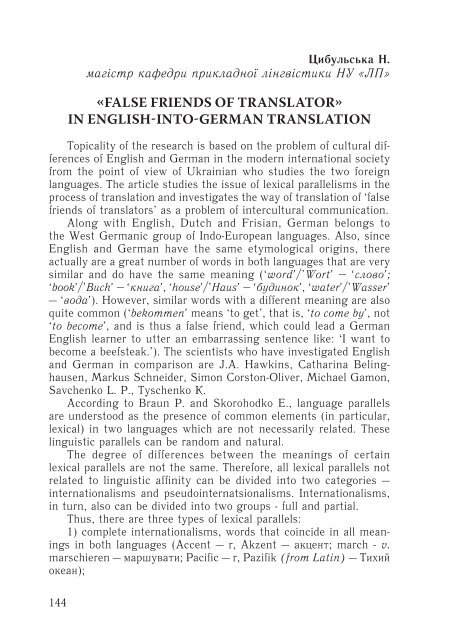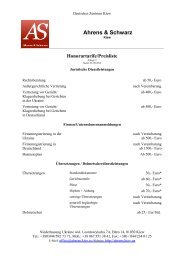ФІЛОЛОГІЯ XXI СТОЛІТТЯ: ТЕОРІЯ, ПРАКТИКА, ПЕРСПЕКТИВИ
ФІЛОЛОГІЯ XXI СТОЛІТТЯ: ТЕОРІЯ, ПРАКТИКА, ПЕРСПЕКТИВИ
ФІЛОЛОГІЯ XXI СТОЛІТТЯ: ТЕОРІЯ, ПРАКТИКА, ПЕРСПЕКТИВИ
Create successful ePaper yourself
Turn your PDF publications into a flip-book with our unique Google optimized e-Paper software.
Цибульська Н.<br />
магістр кафедри прикладної лінгвістики НУ «ЛП»<br />
«FALSE FRIENDS OF TRANSLATOR»<br />
IN ENGLISH-INTO-GERMAN TRANSLATION<br />
Topicality of the research is based on the problem of cultural differences<br />
of English and German in the modern international society<br />
from the point of view of Ukrainian who studies the two foreign<br />
languages. The article studies the issue of lexical parallelisms in the<br />
process of translation and investigates the way of translation of ‘false<br />
friends of translators’ as a problem of intercultural communication.<br />
Along with English, Dutch and Frisian, German belongs to<br />
the West Germanic group of Indo-European languages. Also, since<br />
English and German have the same etymological origins, there<br />
actually are a great number of words in both languages that are very<br />
similar and do have the same meaning (‘word’/’Wort’ – ‘слово’;<br />
‘book’/’Buch’ – ‘книга’, ‘house’/’Haus’ – ‘будинок’, ‘water’/’Wasser’<br />
– ‘вода’). However, similar words with a different meaning are also<br />
quite common (‘bekommen’ means ‘to get’, that is, ‘to come by’, not<br />
‘to become’, and is thus a false friend, which could lead a German<br />
English learner to utter an embarrassing sentence like: ‘I want to<br />
become a beefsteak.’). The scientists who have investigated English<br />
and German in comparison are J.A. Hawkins, Catharina Belinghausen,<br />
Markus Schneider, Simon Corston-Oliver, Michael Gamon,<br />
Savchenko L. P., Tyschenko K.<br />
According to Braun P. and Skorohodko E., language parallels<br />
are understood as the presence of common elements (in particular,<br />
lexical) in two languages which are not necessarily related. These<br />
linguistic parallels can be random and natural.<br />
The degree of differences between the meanings of certain<br />
lexical parallels are not the same. Therefore, all lexical parallels not<br />
related to linguistic affinity can be divided into two categories –<br />
internationalisms and pseudointernatsionalisms. Internationalisms,<br />
in turn, also can be divided into two groups - full and partial.<br />
Thus, there are three types of lexical parallels:<br />
1) complete internationalisms, words that coincide in all meanings<br />
in both languages (Accent – r, Akzent – акцент; march - v.<br />
marschieren – маршувати; Pacific – r, Pazifik (from Latin) – Тихий<br />
океан);<br />
144



